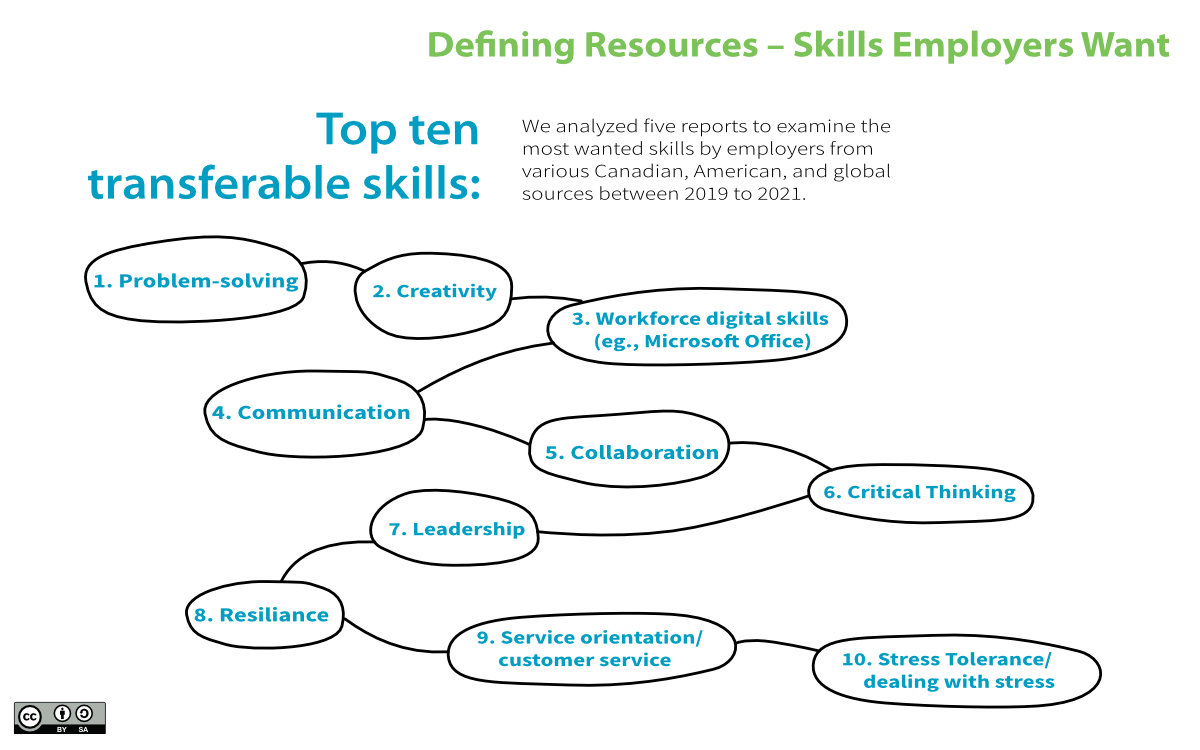Unit Introduction: Defining Resources
Unit Introduction: Defining Resources
“If job seekers want to move beyond the ‘usual suspects’ in their next job transition, they will need to highlight their capabilities and not just their educational and/or experiential qualifications.
Highlighting highly transferable social and emotional skills, such as active listening, critical thinking, and social perceptiveness can make job candidates more attractive.
Taking a skills approach can lead to a broader array of options for job seekers.”
(The Conference Board of Canada, 2021, para. 6)
This unit consists of the following modules:
- The Skills Employers Want,
- Career Search.
The self-directed career management framework (Hirschi, 2012) is the foundational approach for this Resource. Human Capital Resources is one of the four components of the framework and is the focus for the career search module. It brings to light your human capital resources: education, skills, experiences, and mindsets that you bring to the workplace.
The Skills Employers Want module provides an overview of the skills employers value so that you can see how your skills align, and which skills to emphasize in your professional applications. Your ability to articulate these skills gives your career search a leading edge.

If you haven't already done the
Foundation: Professionalism and Communication module, we encourage you to go back to the Demonstrating Skills unit and complete it, as it provides important context to this unit.
We analyzed five reports to examine the most wanted skills by employers from various Canadian, American, and global sources between 2019 to 2021 (Brookfield Institute for Innovation + Entrepreneurship, 2019, 2020; LinkedIn Learning, 2021; LinkedIn Talent
Solutions, 2019; World Economic Forum, 2021).
Two themes emerged: transferable skills and technological skills.

Strong communication, collaboration, and/or creativity skills will continue to rise in demand because of the incline of technology, robotics, and artificial intelligence (AI). Additionally, other factors that support the need for these skills are for instance varied cultures, generations, and virtual work settings. This all will require much more emphasis on transferable skills.
We want to emphasize that while it is clear that transferable skills are sought out in the workplace and this module concentrates on transferable skills—distinct occupational skills will always be required.
In the Career Search module, we touch on:
- The hidden job market,
- Career search,
- Tailoring your professional applications, including, distinguishing transferable skills in job postings,
- Cover letters,
- Resumes,
- Virtual interviews,
- Recruitment,
- Negotiating job offers.
Transferable skills are the vehicle of your career portability. Mastering transferable skills is important, expressing your competence with these skills to potential employers is paramount for your career trajectory - now and for the future.
"In a time of drastic change it is the learners who inherit the future. The learned usually find themselves equipped to live in a world that no longer exists."
-Eric Hoffer
References